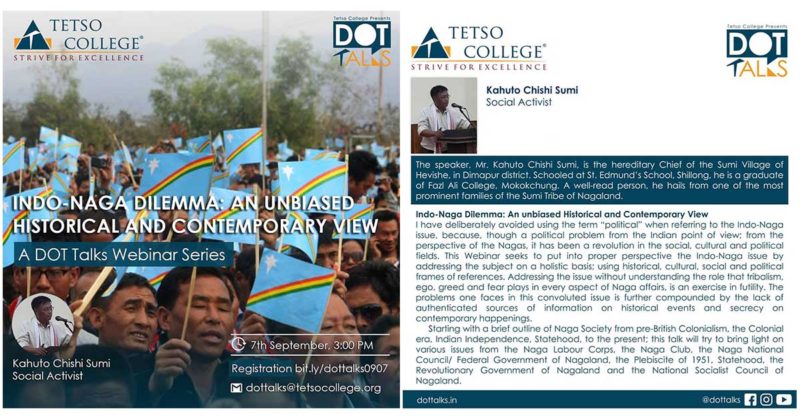Indo–Naga Dilemma: An unbiased Historical and Contemporary View
I have deliberately avoided using the term “political” when referring to the Indo–Naga issue, because, though a political problem from the Indian point of view; from the perspective of the Nagas, it has been a revolution in the social, cultural and political fields. This Webinar seeks to put into proper perspective the Indo–Naga issue by addressing the subject on a holistic basis; using historical, cultural, social and political frames of references. Addressing the issue without understanding the role that tribalism, ego, greed and fear plays in every aspect of Naga affairs, is an exercise in futility. The problems one faces in this convoluted issue is further compounded by the lack of authenticated sources of information on historical events and secrecy on contemporary happenings. Starting with a brief outline of Naga Society from pre-British Colonialism, the Colonial era, Indian Independence, Statehood, to the present; this talk will try to bring light on various issues from the Naga Labour Corps, the Naga Club, the Naga National Council/ Federal Government of Nagaland, the Plebiscite of 1951, Statehood, the Revolutionary Government of Nagaland and the National Socialist Council of Nagaland. But the main focus will be on the ground realities of present day Nagaland. The significance of the semantic shift of the call for Independence from India, to one of Sovereignty then to shared-Sovereignty. The Pan-Naga Hoho, the much touted “Framework Agreement”, its use purported use of the words, “two entities” and its alleged acknowledgement of the “uniqueness” of the Nagas and our “unique” history. And most importantly, a detailed (insofar as possible) the mythical solution that has been dangled before the Nagas, like the proverbial carrot on a stick. The significance of the late shift of demand to a separate Flag and Constitution for Nagaland and the importance of Mr. R. N. Ravi, I.P.S.(Rtd.) as interlocutor and Governor of Nagaland.
The speaker, Mr. Kahuto Chishi Sumi, is the hereditary Chief of the Sumi Village of Hevishe, in Dimapur district. Schooled at St. Edmund’s School, Shillong, he is a graduate of Fazl Ali College, Mokokchung. A well-read person, he hails from one of the most prominent families of the Sumi Tribe of Nagaland. Deriving a direct lineage to the legendary Chuokha Chishi, Chief of Shichimi Village, his great grandfather, Kutu Chishi established the village of Lokobo, approximately 160 years ago. It was his grandfather, Xekhepu Sema, who risked British displeasure and the condemnation of his fellow chiefs to grant the American Missionary, Mr. Bengt Ivar Anderson, permission to open the first Christian Center in Sumi Territory, at Aizuto. His father, Mr. Nivukhu Sema, settled at Mokokchung Town and was one of its most prominent citizens, he was instrumental in the founding of Town Higher Secondary School, one of the first private English schools in Nagaland, Fazl Ali College, the first Arts College in Nagaland, Sumi M.E. School (now Sumi High School) and Nivukhu High School, the first schools ever set up by a tribal community in Nagaland. Drawing from familial familiarity, his elder brother Mr. Inato Chishi being a repository of knowledge on these issues, with nearly all the prominent players, both overground and underground, in the Naga Issue, from colonial times to post Independence to statehood, the speaker’s credentials to discuss the Naga Issue is as good, if not better, than that of any other Naga.
Date: 7th September 2020
Time: 3:00 PM
Registration Link: bit.ly/dottalks0907

